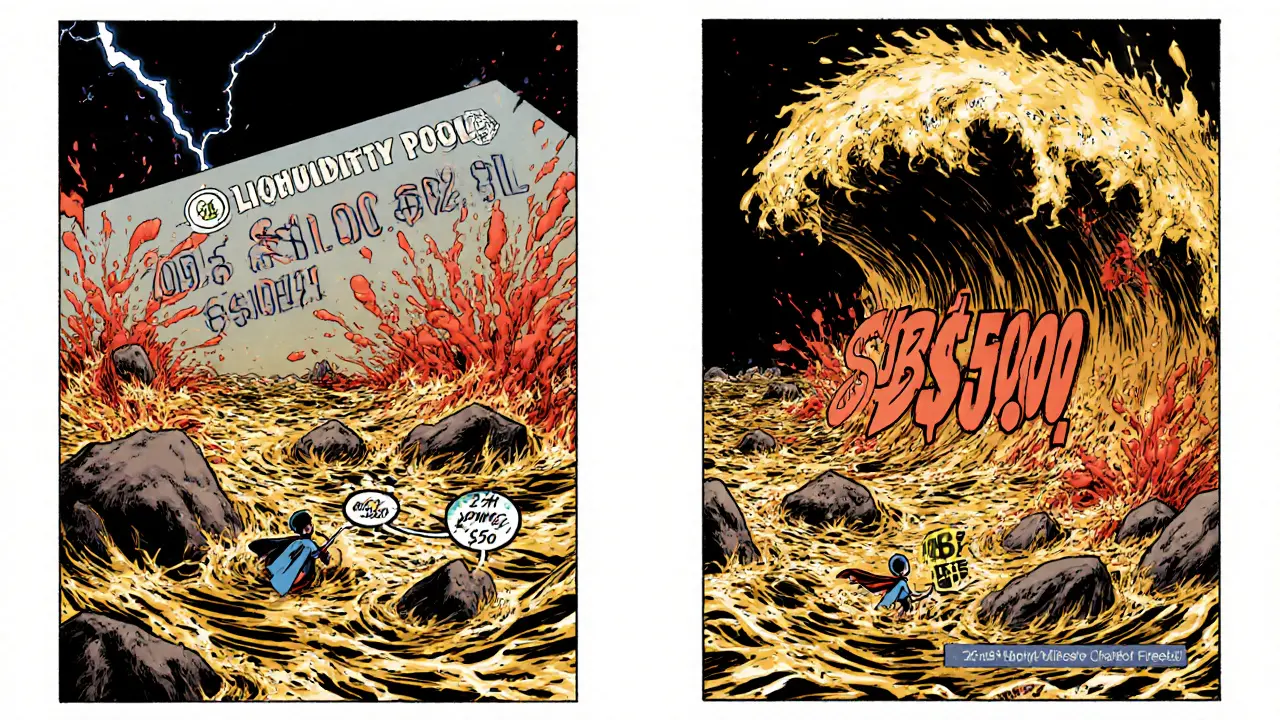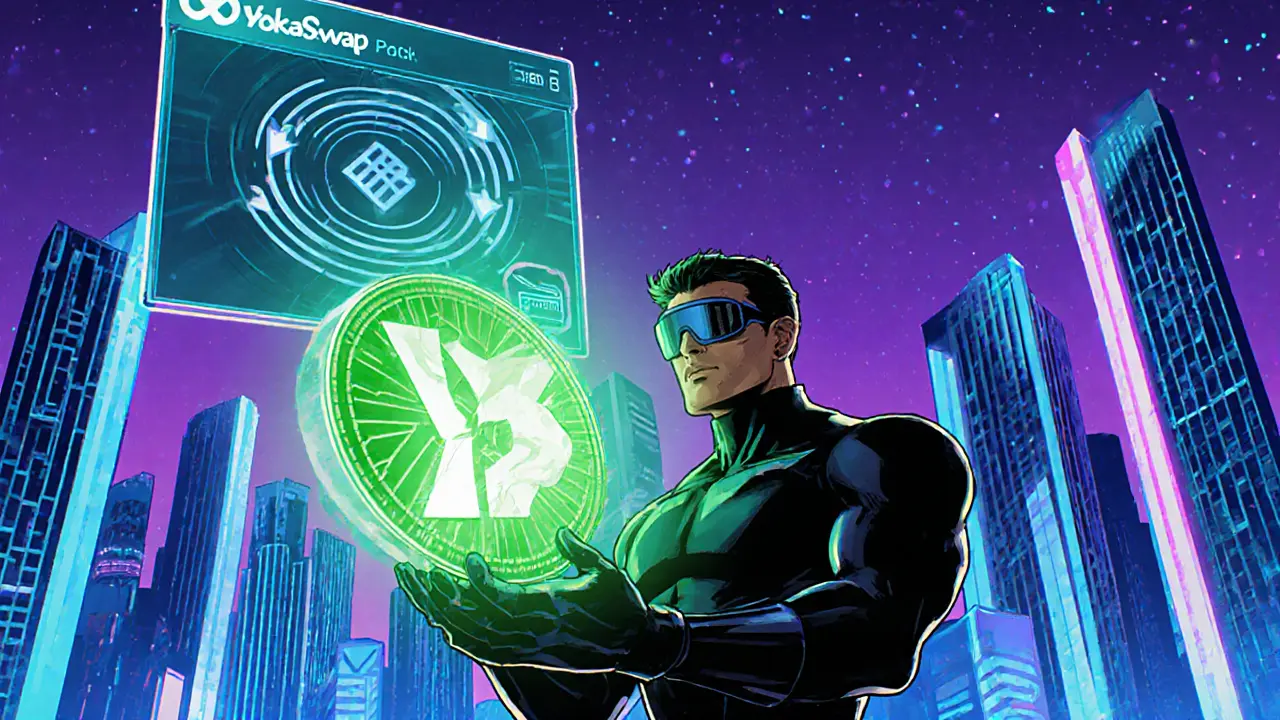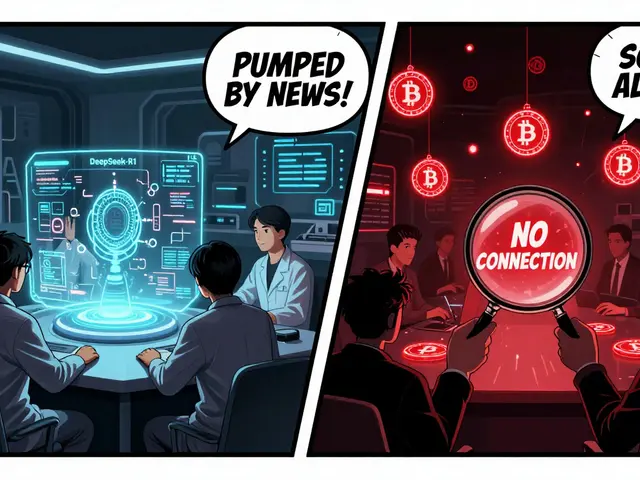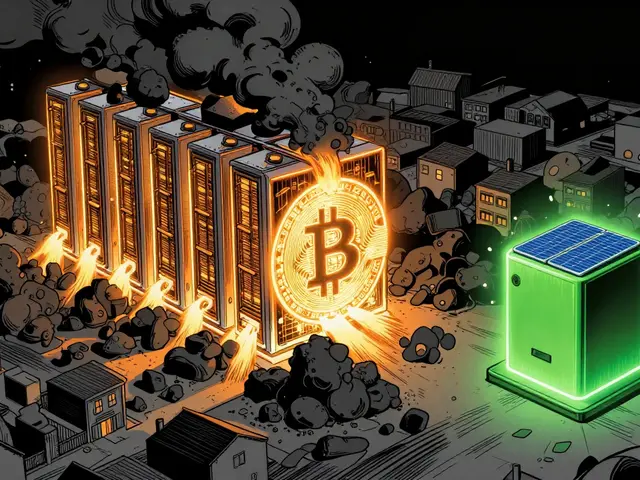YokaiSwap Crypto Exchange Review: Is the Nervos DEX Worth Your Time?
YokaiSwap DEX Performance Calculator
Current 24h Volume
$527.75
(13,735% swing day-over-day)
YOK Token Price
$0.0002
(Max Supply: 1B YOK)
Simulate Trading on YokaiSwap
Simulation Results
Enter values and click calculate to see simulation results
Risk Assessment
Sub-$1,000 pools cause high slippage
No public audit yet
Nervos adoption still early
Use small amounts and stay informed about security updates.
When you hear about a new decentralized exchange (DEX), the first question is usually: YokaiSwap review - does it solve a real problem or is it just another niche platform? In this deep dive we’ll break down what YokaiSwap actually offers, how its numbers stack up against the heavy‑hitters, and whether you should consider it for swapping tokens or earning yields.
What is YokaiSwap?
YokaiSwap is a decentralized cryptocurrency exchange built on the Nervos Network. Launched in 2021, it claims to be the first Automated Market Maker (AMM) on Nervos, combining swap functionality, yield farming and staking in a single UI.
Behind the scenes, the platform is backed by inNervation, a fund created through a partnership between CMB International and the Nervos Network. This institutional support gives YokaiSwap a foothold as a core DeFi infrastructure piece for the Nervos ecosystem.
How the Platform Works
Like other AMM‑style DEXs, YokaiSwap lets you trade directly from your wallet without a central order book. You provide liquidity to a pool, the smart contract calculates prices based on the constant‑product formula, and you receive a share of the transaction fees.
The native token, YOK, powers the ecosystem. YOK has a max supply of 1billion, with roughly 450million already circulating. Holders can stake YOK for additional rewards or use it to vote on governance proposals.
Because it lives on Nervos, you need a compatible wallet (e.g., Neuron, WalletConnect‑enabled wallets) and must bridge assets onto the network before you can swap. That extra step is the biggest friction point for users coming from Ethereum or BSC.
Performance Snapshot (Oct2025)
Numbers matter, so let’s look at the latest on‑chain stats:
- 24‑hour trading volume: $527.75 (a 13,735% swing day‑over‑day, indicating very thin liquidity).
- Active pairs: 6 (YOK/WCKB dominates with $490.96 of daily volume, about 93%).
- YOK token price: $0.0002.
- Liquidity depth: sub‑$1,000 in most pools, leading to noticeable slippage on modest trades.
Compared to giants like Uniswap (average daily volume > $2billion) or PancakeSwap (≈ $300million), YokaiSwap sits in the 31st percentile for DEX volume. The low numbers aren’t necessarily a flaw - they reflect a very targeted user base within the Nervos community.
How YokaiSwap Stacks Up Against the Competition
| Metric | YokaiSwap | Uniswap (v3) | PancakeSwap |
|---|---|---|---|
| Base Chain | Nervos | Ethereum | Binance Smart Chain |
| 24‑hr Volume (USD) | $527.75 | $2B+ | $300M+ |
| Trading Pairs | 6 | ≈10000 | ≈3500 |
| Native Token Price | $0.0002 (YOK) | $21 (UNI) | $4.5 (CAKE) |
| Liquidity Incentives | Yield farming & staking on YOK | Liquidity mining, fee rebates | Liquidity mining, Syrup pools |
The table makes it clear: YokaiSwap is a niche player with far fewer assets and a tiny volume. Its advantage lies in being the first DEX on Nervos and in offering YOK‑specific incentives. If you are already deep into the Nervos ecosystem, the platform’s native integration may outweigh the liquidity concerns.

Pros and Cons - A Quick Checklist
- Pros
- First‑mover on Nervos, giving early adopters a dedicated AMM.
- Institutional backing by CMB International adds financial stability.
- YOK staking rewards can boost passive income.
- Roadmap mentions Cardano and Ethereum bridges, hinting at future cross‑chain potential.
- Cons
- Very low liquidity → high slippage for anything beyond a few dollars.
- Limited token selection (only 5 coins, 6 pairs).
- Complex onboarding - users must understand Nervos wallets and bridging.
- Minimal community chatter; few reviews, little public scrutiny.
- No margin trading, and fee structure is not transparently documented.
Step‑by‑Step: How to Trade on YokaiSwap
- Set up a Nervos-compatible wallet (e.g., Neuron or a WalletConnect‑enabled app).
- Acquire some WKCB (Wrapped CKByte) or YOK on a centralized exchange that supports Nervos (you may need to use a bridge like Force Bridge).
- Connect your wallet to the YokaiSwap website by clicking the “Connect Wallet” button.
- Select the desired pair - most users start with YOK/WCKB.
- Enter the amount you want to swap. The interface shows estimated slippage; keep it under 1% if possible.
- Confirm the transaction in your wallet. The smart contract executes instantly, and you’ll see the new balance.
- If you want to earn yields, navigate to the “Earn” tab, add liquidity to a pool, and stake the LP tokens for YOK rewards.
That’s it. The whole process takes about five minutes once you have the wallet and assets ready.
Risk Profile - What to Watch Out For
Every DeFi platform carries risk, and YokaiSwap is no exception. Here are the key areas:
- Liquidity Risk: With daily volume under $1k, large orders can move the price dramatically.
- Smart‑Contract Risk: The code has not been audited by major firms like CertiK or OpenZeppelin, so undiscovered bugs could exist.
- Network Risk: Nervos adoption is still in early stages; a slowdown could affect token value and usage.
- Regulatory Uncertainty: While DeFi remains largely unregulated, any future policy changes could impact cross‑chain bridges that YokaiSwap plans to use.
Mitigation strategies include keeping trade sizes small, using hardware wallets for private keys, and staying updated on any security audits released by the team.
Future Outlook - Will YokaiSwap Grow?
The roadmap promises two big upgrades: a Cardano bridge and Ethereum interoperability. If those roll out, the exchange could tap into vastly larger liquidity pools and attract users who otherwise avoid Nervos because of its smaller ecosystem.
However, execution is the real test. So far, there’s no public audit report, and community engagement remains low. The platform’s survival will hinge on two factors:
- Broader Nervos adoption - more dApps, more developers, more users.
- Successful launch of cross‑chain bridges - without them, YokaiSwap stays isolated.
Until those milestones hit, treat the exchange as a niche tool for early adopters rather than a mainstream swapping hub.
Frequently Asked Questions
Is YokaiSwap safe to use?
Safety depends on three things: smart‑contract code, network health, and liquidity depth. YokaiSwap’s contracts have not undergone a public audit, and the Nervos network is still growing, so users should start with small amounts and keep an eye on community updates.
How do I get YOK tokens?
You can buy YOK on a few centralized exchanges that list it, or you can acquire WKCB, bridge it to Nervos, and swap for YOK directly on YokaiSwap.
What fees does YokaiSwap charge?
The platform states there are no market‑based fees, but a small protocol fee (usually around 0.3%) is taken from each trade and distributed to liquidity providers.
Can I provide liquidity and earn YOK rewards?
Yes. By adding tokens to a pool you receive LP tokens, which can be staked in the “Earn” section for additional YOK reward distribution.
When will Cardano and Ethereum bridges be live?
The team has not set a firm date. Their roadmap lists the bridges for Q42025, but delays are common in cross‑chain projects, so keep checking official announcements.






23 Comments
Gaurav Joshi
August 9 2025YokaiSwap positions itself as the first AMM on Nervos offering a dedicated swap and yield layer for early adopters while keeping the interface simple and the fee structure low
Kathryn Moore
August 11 2025In practice the thin liquidity means any trade above a few dollars will move the price significantly thus rendering the platform impractical for sizable swaps
Christine Wray
August 13 2025The concept of a Nervos‑specific DEX is appealing for developers who want to experiment with the cell model without competing on crowded chains
roshan nair
August 15 2025When evaluating YokaiSwap you should first acknowledge that the platform is built on a relatively new layer‑1 which means the underlying security assumptions are still evolving. The native YOK token serves both as a governance instrument and as an incentive for liquidity providers, however its market depth is virtually negligible. Because most pools sit below $1,000 in total value, even a modest $10 trade can incur slippage well above 5 percent, eroding any potential arbitrage. The smart contracts have not undergone a public audit by a reputable firm, so there is a non‑trivial risk of undiscovered bugs that could be exploited. Users are required to bridge assets onto Nervos first, adding an extra step that many newcomers may find confusing or off‑putting. While the UI is straightforward, the documentation around fee structures and reward calculations is sparse, making it hard to predict real returns. Staking YOK does provide additional yields, but those rewards are paid in the same low‑liquidity token, amplifying exposure to price volatility. On the upside, the backing by CMB International suggests some level of financial commitment which could sustain development for the near term. The roadmap promises cross‑chain bridges to Cardano and Ethereum, and if delivered these could dramatically improve liquidity and user adoption. Until those bridges are live, the DEX remains largely siloed within the Nervos ecosystem. Community engagement is modest; there are few active discussion channels, which may hinder rapid detection of bugs. For risk‑averse traders, the prudent approach is to allocate only small amounts you are willing to lose while monitoring audit updates. Conversely, early adopters looking for high‑risk, high‑reward opportunities might find the platform intriguing. In summary, YokaiSwap offers a niche solution for Nervos enthusiasts but carries significant liquidity and security risks that should be weighed carefully before committing capital.
Jay K
August 17 2025It is worth noting that the operational overhead of managing wallets on Nervos may deter users accustomed to the plug‑and‑play experience of Ethereum based DEXs
bob newman
August 19 2025Sure, because nothing says "secure" like a platform that hasn't been audited, right? Just hop on with your life savings and enjoy the thrill of potential rug pulls.
Anil Paudyal
August 21 2025Looks like a niche DEX.
Kimberly Gilliam
August 23 2025Honestly the drama around "new" DEXs feels like watching a low‑budget sequel that promises the world but delivers a glitchy UI and empty order books
Jeannie Conforti
August 25 2025For anyone feeling unsure, start with a tiny trade and watch the slippage numbers before committing larger amounts
tim nelson
August 27 2025I understand the hesitation many have with low‑liquidity pools; a cautious approach helps avoid unexpected losses while you get familiar with the platform's mechanics
Zack Mast
August 29 2025One could argue that investing in a barely‑used protocol mirrors the existential quest for meaning in an indifferent universe, where every trade is a fleeting whisper against the void of decentralization
Dale Breithaupt
August 31 2025Keep it simple – test with a $5 swap, check the fee, and if it looks ok, consider adding a bit more liquidity
Rasean Bryant
September 2 2025Optimistically speaking, the upcoming cross‑chain bridges could unlock fresh capital and bring much‑needed depth to the pools
Angie Food
September 4 2025Honestly, this whole thing feels like a meme project that will fade once the hype dies down, leaving early participants with dust
Jonathan Tsilimos
September 6 2025The protocol's fee architecture is predicated on a 0.3 percent spread which, when compounded across low‑volume trades, yields negligible revenue for LPs and thus discourages deeper capital allocation
jeffrey najar
September 8 2025From a practical standpoint, the steps to bridge assets onto Nervos are straightforward if you follow the official guide, and the UI makes staking YOK fairly accessible
Rochelle Gamauf
September 10 2025It is evidently a sub‑optimal environment for serious investors, given the conspicuous absence of robust audit reports and the meager trading volume that fails to justify any meaningful arbitrage opportunities
Jerry Cassandro
September 12 2025Could you clarify whether the current YOK staking rewards are compounded daily or only distributed at the end of each epoch?
Parker DeWitt
September 14 2025Wow, another crypto platform promising the moon 🌙🚀. Spoiler: it probably won’t get off the ground.
Allie Smith
September 16 2025In the grand tapestry of decentralized finance, YokaiSwap is but a single thread, yet even a thin thread can hold together a larger pattern if woven correctly
Lexie Ludens
September 18 2025Watching this project reminds me of a tragic play where every act ends in disappointment, yet the audience stays for the drama
Aaron Casey
September 20 2025The current liquidity metrics indicate a systemic deficiency in capital inflow, which, if unaddressed, will perpetuate high slippage and deter institutional participation
Leah Whitney
September 22 2025If you’re curious about the bridging process, the community Discord often shares step‑by‑step tutorials that can help smooth the learning curve